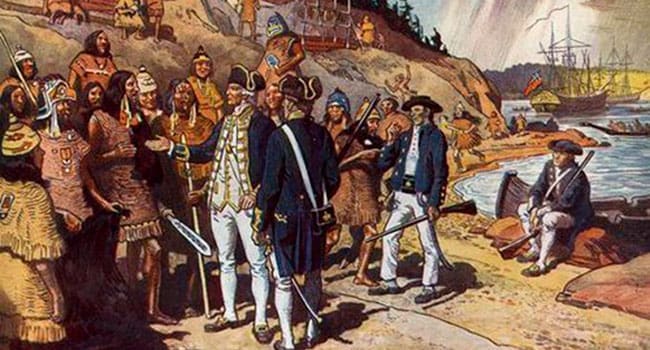 In early March of 1778, Capt. James Cook sailed the Royal Navy sloops Resolution and Discovery into Nootka Sound looking for water, solid timber to replace some broken masts and spars, and new lands to claim for King George III.
In early March of 1778, Capt. James Cook sailed the Royal Navy sloops Resolution and Discovery into Nootka Sound looking for water, solid timber to replace some broken masts and spars, and new lands to claim for King George III.
At this point during his celebrated third expedition of discovery, the ships and crews had been at sea for almost two years. They quickly dropped anchor in a small, unprotected bay and soon the sailors saw some 30 large canoes heading their way, “the paddlers singing a most melodious chant.”
Cook being Cook, an orchestral group of musical sailors was mustered on the stern of the Discovery, with flutes and horns to provide a reciprocal serenade.
“Noot’ ka ichim!” the local residents cried as they drew their canoes beside the ships. Cook took this to be the name of their homeland and that night wrote in the expedition’s log that he was anchored in “Nootka Sound.”
The following day, he took a longboat to their village, near the mouth of the sound, and found the people friendly and eager to trade. Accordingly, he named their village “Friendly Cove.”
Remarkably, it’s still possible to discuss this first moment of cultural contact in Yuquot (Friendly Cove’s Mowachaht language name) today with an indigenous family who lives there – the Williams. Our families have been friends for more than 40 years. Before we took our first trip to Nuchatlitz, I had two long phone calls with Ray Williams, the patriarch of the family, who with his wife Terry has lived his entire life in Yuquot, “the place where the wind blows in all directions.”
In past conversations, Ray and Terry have patiently explained Cook’s various linguistic confusions, and described how his crews looked to the Mowachaht of the Maquinna chiefdom. “In our language, ‘Noot’ ka ichim’ approximates, ‘Go around!’ The people in the canoes were telling Cook to re-anchor in the sheltered bay of Yuquot. He had his ships in a pretty exposed spot.”
Ray and Terry have also taught us the meaning of the word, “mummucknee,” the generic Moachaht word for ‘white man.’ “It means people who live on floating islands,” they often say with laughter. To the Moachaht (“people of the deer”), Caucasians have been mummucknee since Cook and his sailors arrived on their two floating islands.
There are many other stories about the mummucknee. Like the one that Sockeye Salmon was a crew-member. “He was probably an old sailor with a crooked back, a big bulbous nose and red, sunburned skin,” Ray once told me. “He looked like a supernatural sockeye, I guess.”
The Mowachaht were also surprised that the mummucknee lived without women. “How was that, people wondered?”
When Ray and I recently discussed our upcoming kayak trip to Nuchatlitz, on the extreme northwestern tip of Nootka Island, he referred back to his boyhood trips to the area.
“You need to know how to get a boat in there, Michael. It’s tricky; very shallow. And there is no water, except from an old well on one of the reserves. It’s hard to find. Make sure you carry water. And you won’t be able to fish for halibut in the lagoon. They are offshore – outside the reefs.
“None of our people live there any more. But there is one island filled with mummucknees.”
My ears perked up.
I learned that there were four Indian reserves (IRs on my nautical chart) associated with Nuchatlitz lagoon, and the large, encompassing provincial park. One private island had somehow been cut from the pervasive provincial Crown land tenures in the area. We decided to check it out.
And so on the second day of our week in Nuchatlitz, we paddled to Mummucknee Island. Sure enough, there were about 10 houses on its foreshore, all with spiffy ramps and floats. A few skookum, outboard-powered aluminum boats were tied up, indicating residency in the final week of June.
A friendly woman emerged from a two-storey frame house as we paddled by and called out to us.
“Where are you camped?”
“Island 40,” I replied, citing the bizarre notation on my chart.
“I am so lucky to live here!” she responded.
I made a mental note to tell Ray and Terry that things were looking up for the mummucknee. “Guess what – they’ve discovered women!”
Mike Robinson has been CEO of three Canadian NGOs: the Arctic Institute of North America, the Glenbow Museum and the Bill Reid Gallery. Mike has chaired the national boards of Friends of the Earth, the David Suzuki Foundation, and the Canadian Parks and Wilderness Society. In 2004, he became a Member of the Order of Canada.
The views, opinions and positions expressed by columnists and contributors are the author’s alone. They do not inherently or expressly reflect the views, opinions and/or positions of our publication.

